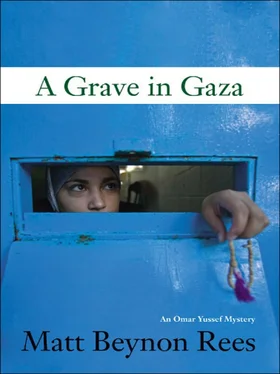Matt Rees - A grave in Gaza
Здесь есть возможность читать онлайн «Matt Rees - A grave in Gaza» весь текст электронной книги совершенно бесплатно (целиком полную версию без сокращений). В некоторых случаях можно слушать аудио, скачать через торрент в формате fb2 и присутствует краткое содержание. Жанр: Криминальный детектив, на английском языке. Описание произведения, (предисловие) а так же отзывы посетителей доступны на портале библиотеки ЛибКат.
- Название:A grave in Gaza
- Автор:
- Жанр:
- Год:неизвестен
- ISBN:нет данных
- Рейтинг книги:5 / 5. Голосов: 1
-
Избранное:Добавить в избранное
- Отзывы:
-
Ваша оценка:
- 100
- 1
- 2
- 3
- 4
- 5
A grave in Gaza: краткое содержание, описание и аннотация
Предлагаем к чтению аннотацию, описание, краткое содержание или предисловие (зависит от того, что написал сам автор книги «A grave in Gaza»). Если вы не нашли необходимую информацию о книге — напишите в комментариях, мы постараемся отыскать её.
A grave in Gaza — читать онлайн бесплатно полную книгу (весь текст) целиком
Ниже представлен текст книги, разбитый по страницам. Система сохранения места последней прочитанной страницы, позволяет с удобством читать онлайн бесплатно книгу «A grave in Gaza», без необходимости каждый раз заново искать на чём Вы остановились. Поставьте закладку, и сможете в любой момент перейти на страницу, на которой закончили чтение.
Интервал:
Закладка:
“The Jewish Bible says Gaza was allotted to the tribe of Judah,” Omar Yussef said.
“Of course, but don’t mention that-a thunderbolt may come down from the skies to strike us.” Maki looked up in mock terror. “Or one of the homemade Qassam rockets that our resistance fires into Israel.”
“You recounted these ancient invasions. But what importance do they have for the present conflict?”
“Great importance, indeed. They’re the roots of today’s conflict. Your foreign friends look at Gaza and see what? A shithole, of course. Who can blame them? The Scot is probably from Edinburgh, the Athens of the north, as they call it. Very cultural. Maybe the other one’s from the highly organized city of Stockholm, where no one crosses the road and farts at the same time. To them, Gaza is the epitome of absolute, worthless chaos. But Gaza was a crossroads of international trade when they were still painting themselves blue to raid the next village and steal its pigs.”
Maki took such a long drink of his claret that he was momentarily out of breath. “Look, if you read the surveys, you’d see that Swedish women have the smallest breasts, on average, in the whole world.” Maki rubbed his silk shirt in illustration. “Why? Because they don’t understand how to share life and its bounty. They’re individualists. Now Gazan women: under their robes they carry enormous breasts, big and heavy and full, like the hump of a camel.” He pursed his lips, screwed up his eyes and held his palms upward as though they supported a great and sensuous weight. “This is because we’re surrounded by the desert, so we understand the value of life, of food and nourishment and community. Nature around us is harsh. We can’t look to it for easy sustenance, as they can in Sweden, with their lakes and forests. We must find nutrition in each other, in the fulsome bodies of our wives and in the feeling of belonging to a clan and in the shared struggle against the Jews. That’s the story of Gaza.”
Omar Yussef nodded and stretched his lips into some kind of a smile. He was glad Maki was enjoying his cultured evening discussion.
The Sri Lankan maid brought a platter of grilled, fatty lamb chops and kebab on metal skewers and charred chicken flecked with red grains of sumac. Maki slid the kebab from the skewers with a folded piece of bread and filled Omar Yussef’s plate. He picked up a roasted onion and pulled it apart with his fingers.
“The invaders continued to come. Saladin fought the Crusaders here, and then came the Turks.” Maki made circles in the air with the onion pieces, daintily, like a conductor with his baton. “The British fought three battles here before they took Gaza in 1917. Can you imagine? Do you suppose the British people know this, riding the London Underground and shaking their heads with a tut-tut as they read stories about Gaza’s violence in The Daily Telegraph?” Maki waved a segment of onion dismissively. “As they see it, the violence here is all about our immediate conflict with the Jews-we could have peace, if only we were reasonable, like the British. They don’t understand our three thousand years of oppression.”
“The problem isn’t that the Telegraph readers don’t know our history, Abu Nabil,” Omar Yussef said. “Our own people don’t know it, either. They learn history only in nasty cartoon form or from the mouths of politicians. How many people who claim to fight in the name of Saladin know anything about him, except that he was a hero who fought the Christians? They probably think he was a Palestinian, rather than a Kurd.”
Maki stared over the top of his wineglass. He made his voice serious and quiet. “As a historian, I should like to sit in on your classes, Abu Ramiz,” Maki said. “But I’m also a politician. I’d like to talk to you now about politics.”
“I welcome the opportunity to be your student.”
“The situation with Masharawi is very delicate,” Maki said. He rolled his wine around in his glass and watched the light of the chandelier filter through it. “I must appeal to you as a brother Palestinian that this case should go no further.”
“That’s not up to me.”
“I think it is.”
“Did I arrest him? I didn’t report him to Colonel al-Fara. Oh, and I forgot to bring the keys of his jail cell with me tonight.”
Maki stared at his wine.
Omar Yussef reminded himself to stay calm. He needed Maki on his side if he was to secure Masharawi’s release. He made his voice sweet. “Forgive me. Do you have any new information about the investigation into Masharawi, Abu Nabil?”
“It’s a very serious case, Abu Ramiz. There’s evidence of his involvement in espionage.”
“How could a teacher possibly help a spy agency?”
“By disrupting the work of our university and poisoning the minds of our best students against the government and the security forces.”
“What evidence is there of this?”
“He has signed a confession.”
“He signed?”
Maki lifted his chin and held his palms forward in a gesture of finality. “Confessing everything.”
“Under torture.”
“We don’t torture prisoners.”
“We? I’m not referring to the university, Abu Nabil.”
“Neither am I. I mean that we Palestinians do not torture prisoners.”
Omar Yussef waited as the Sri Lankan slid a platter of fruit onto the table. The professor took a paring knife to an orange and cut it into sections.
“Then he will be put on trial?” Omar Yussef said.
“If the security forces brought him to trial, it would only allow him to spread his false propaganda once more.”
“Then what do you intend to do with him?”
“That depends on whether the UN makes a big deal out of it. If the UN remains quiet, then it’s possible that we might be able to allow Masharawi to go free.”
“Release a spy?”
“After a suitable period in jail undergoing some punishment for his crimes.”
“More torture.”
“Punishment.” Maki raised his eyebrows and waved a segment of orange at Omar Yussef. “But it would be necessary to persuade the UN to remain quiet. If it becomes a diplomatic issue, it will be difficult for Colonel al-Fara to back down. Masharawi might have to be executed, as a traitor.”
“Wallender already has been told that Masharawi was tortured. He won’t just let that go.”
“The Swede is at your mercy, Abu Ramiz. He doesn’t speak Arabic, right? He doesn’t understand the culture or the players. He knows only what you let him know.” Maki smiled like a contented man sinking into a hot bath. “I don’t expect your cooperation just because of my beautiful eyes, Abu Ramiz. I can offer you incentives.”
Omar Yussef glanced around the room. He thought of the furnishings in his own home. He and Maryam were comfortable, but there was something seductive about a room of such lavish excess. The Sri Lankan brought a coffee and put it before him. She smelled of spices and kitchen sweat.
Maki grinned and nodded toward the Sri Lankan as she left. “Incentives of whatever taste you may have.”
“She’s too skinny for me,” Omar Yussef said. Keep a grip, he thought. Don’t let him know that you won’t help him. “I shall do what I can, Abu Nabil. But you have to give me something I can offer the Swede. Some way for him to feel he saved Masharawi. Perhaps if Masharawi were simply suspended from teaching for a semester.”
“He would have to be suspended from opening his mouth. The fool can’t help but broadcast ugly accusations every time he talks.”
“If Colonel al-Fara allowed me and Wallender to visit Masharawi, we might be able to persuade him to reach a deal. To keep his mouth shut.”
“I would prefer to make you happy in some way.”
Читать дальшеИнтервал:
Закладка:
Похожие книги на «A grave in Gaza»
Представляем Вашему вниманию похожие книги на «A grave in Gaza» списком для выбора. Мы отобрали схожую по названию и смыслу литературу в надежде предоставить читателям больше вариантов отыскать новые, интересные, ещё непрочитанные произведения.
Обсуждение, отзывы о книге «A grave in Gaza» и просто собственные мнения читателей. Оставьте ваши комментарии, напишите, что Вы думаете о произведении, его смысле или главных героях. Укажите что конкретно понравилось, а что нет, и почему Вы так считаете.












